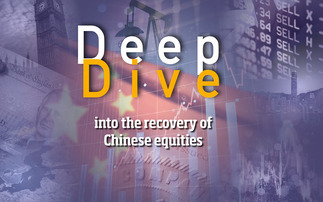Industry Voice: After a largely lacklustre 2018, sentiment on the emerging markets has improved since the beginning of the year. Capital flows have recovered as a result. So what's next? Chanchal Samadder and Philippe Baché share their views.
View Lyxor's range of Emerging Markets ETFs
Easing trade tensions, almost orchestrated central bank retreat from policy tightening and dollar weakness have been the key drivers of performance and flows so far. And, for now at least, we don't see that changing.
Conditions look set fair for equities then, but some areas are likely to provide greater opportunity than others, so some selectivity wouldn't go amiss. We expect returns to differ and diverge between countries and regions as individual idiosyncracies come to the fore.
When it comes to bonds, we expect more policy support from most EM central banks. As long as US rate expectations remain subdued, easier external funding conditions should give those countries with real currency sensitivity or heavy external debt burdens more breathing room. Lesser inflation pressures also offer ample scope for rate cuts. Local and hard currency bonds should benefit for a while yet.
Don't, however, wait too long before stepping in. Trade will remain a talking point and this round of the Great Game between the US and China is far from played out. Tighter liquidity conditions will weigh on returns in the longer term.
Our equity outlook for the key countries and regions:
- Positive on EM Asia
EM Asia is our favourite equity region because of Fed dovishness, the trade war ceasefire and a softer stance on deleveraging in China. A longer US cycle - one that endures beyond H1 2020 - would also be supportive. Earnings growth and valuations appeal.
Lyxor MSCI EM Asia UCITS ETF - Ac
- China:
Escalating trade tensions, a weaker yuan, and deleveraging all weighed heavily on stocks last year. Growth is slowing. Seen differently though, growth is still twice as fast as the US and three times faster than the rest of the developed world. China is also one of the few large economies with the ability to relax fiscal policy further as recent announcements have proved. Upside potential is huge over the long term provided the model keeps shifting toward sustainable growth. Valuations also seem reasonable.
Lyxor China Enterprise (HSCEI) UCITS ETF - Acc
Lyxor MSCI China UCITS ETF - Acc
Lyxor Hwabao WP MSCI China A (DR) UCITS ETF - Acc
- India:
India is another country with a lot to offer. Parliamentary elections in May and tensions over Kashmir could be short-term stumbling blocks, but the structural story is intact. Corporate earnings are improving, and we expect to see further profit normalisation for financials. The next five years should be about growth and corporate re-leveraging - a combination well capable of improving share price performance. Domestic inflows have also been a source of real support. They have helped reduce volatility, lessen sensitivity with other emerging markets and dampen drawdowns. There's little doubt in our mind that Indian equities should be a core holding in EM portfolios.
- Indonesia:
We remain positive with earnings growth still strong and forthcoming elections likely to pass without too much alarm. Limited oil and yuan sensitivity offers growth at affordable price. Currency stability should support foreign capital flows into equities and bonds.
- Malaysia:
Macro indicators are stabilising. The country is also benefiting from a recovery in raw material prices, which has been reflected in export growth. However, valuations remain near-average despite having underperformed other Asian peers quite significantly over the past 12 months - a factor which could gate any gains.
Lyxor MSCI Malaysia UCITS ETF - Acc
- Korea:
Their recent rebound notwithstanding, Korea equities are likely to continue to underperform Asian peers with more earnings downgrades ahead for the tech sector.
- Taiwan:
The outlook is also bleak for Taiwan equities. Valuations remain marginally above average and a case for re-rating can only be made should there be signs of improvement in the tech sector - something which is unlikely for now.
Lyxor MSCI Taiwan UCITS ETF - Acc
- A neutral stance on Latin America…
Political and policy uncertainty will be key themes and are likely to hinder returns, particularly in post-electoral Brazil and Mexico. Both countries are very sensitive to moves in the US interest rate environment and the dollar, leaving them vulnerable to bouts of volatility.
Lyxor MSCI EM Latin America UCITS ETF - Acc
- Brazil:
A reality check is likely with the strong recovery of H2 2018 running out of steam and investors in need of much greater clarity on the reform process. The positive long-term support from the more market friendly programme is now well priced-in. With GDP growth sluggish, we see limited corporate growth ahead.
Lyxor MSCI Brazil UCITS ETF - Acc
- Mexico:
Prospects are unclear under a new, staunchly leftist leader. A deteriorating trade outlook and tighter financial conditions are likely to weigh on demand, but stronger government investment could drive growth in some sectors. Low valuations could make the market attractive on a tactical basis.
…and EMEA
- Russia:
Worsening tensions with the US will keep volatility high. The positive way oil prices have responded to the OPEC+ agreement on production cuts should provide some support but the possibility of heavier US sanctions weighs on the long-term view. Caution is advised despite cheap valuations.
Lyxor MSCI Russia UCITS ETF - Acc
- Poland:
Domestic demand, consumption and investment growth should remain solid, but corporate profits have been declining on the back of rising competition and cost pressures. Pre-election fiscal stimulus plans may provide some relief, but the anticipation of those elections in 2020 may bring more volatility.
THIS COMMUNICATION IS FOR ELIGIBLE COUNTERPARTIES OR PROFESSIONAL CLIENTS ONLY
This document is for the exclusive use of investors acting on their own account and categorized either as "Eligible Counterparties" or "Professional Clients" within the meaning of Markets in Financial Instruments Directive 2004/39/EC. These products comply with the UCITS Directive (2009/65/EC). Société Générale and Lyxor International Asset Management (LIAM) recommend that investors read carefully the "investment risks" section of the product's documentation (prospectus and KIID). The prospectus and KIID are available free of charge on www.lyxoretf.com, and upon request to [email protected].
The products mentioned are the object of market-making contracts, the purpose of which is to ensure the liquidity of the products on the London Stock Exchange, assuming normal market conditions and normally functioning computer systems. Units of a specific UCITS ETF managed by an asset manager and purchased on the secondary market cannot usually be sold directly back to the asset manager itself. Investors must buy and sell units on a secondary market with the assistance of an intermediary (e.g. a stockbroker) and may incur fees for doing so. In addition, investors may pay more than the current net asset value when buying units and may receive less than the current net asset value when selling them. Updated composition of the product's investment portfolio is available on www.lyxoretf.com. In addition, the indicative net asset value is published on the Reuters and Bloomberg pages of the product, and might also be mentioned on the websites of the stock exchanges where the product is listed.
Prior to investing in the product, investors should seek independent financial, tax, accounting and legal advice. It is each investor's responsibility to ascertain that it is authorised to subscribe, or invest into this product. This document is of a commercial nature and not of a regulatory nature. This material is of a commercial nature and not a regulatory nature. This document does not constitute an offer, or an invitation to make an offer, from Société Générale, Lyxor Asset Management (together with its affiliates, Lyxor AM) or any of their respective subsidiaries to purchase or sell the product referred to herein.
Lyxor International Asset Management (LIAM), société par actions simplifiée having its registered office at Tours Société Générale, 17 cours Valmy, 92800 Puteaux (France), 418 862 215 RCS Nanterre, is authorized and regulated by the Autorité des Marchés Financiers (AMF) under the UCITS Directive (2009/65/EU) and the AIFM Directive (2011/31/EU). LIAM is represented in the UK by Lyxor Asset Management UK LLP, which is authorized and regulated by the Financial Conduct Authority in the UK under Registration Number 435658. Société Générale is a French credit institution (bank) authorised by the Autorité de contrôle prudentiel et de résolution (the French Prudential Control Authority).
Lyxor International Asset Management ("LIAM") or its employees may have or maintain business relationships with companies covered in its research reports. As a result, investors should be aware that LIAM and its employees may have a conflict of interest that could affect the objectivity of this report. Investors should consider this report as only a single factor in making their investment decision. Please see appendix at the end of this report for the analyst(s) certification(s), important disclosures and disclaimers. Alternatively, visit our global research disclosure website www.lyxoretf.com/compliance.
CONFLICTS OF INTEREST This research contains the views, opinions and recommendations of Lyxor International Asset Management ("LIAM") Cross Asset and ETF research analysts and/or strategists. To the extent that this research contains trade ideas based on macro views of economic market conditions or relative value, it may differ from the fundamental Cross Asset and ETF Research opinions and recommendations contained in Cross Asset and ETF Research sector or company research reports and from the views and opinions of other departments of LIAM and its affiliates. Lyxor Cross Asset and ETF research analysts and/or strategists routinely consult with LIAM sales and portfolio management personnel regarding market information including, but not limited to, pricing, spread levels and trading activity of ETFs tracking equity, fixed income and commodity indices. Trading desks may trade, or have traded, as principal on the basis of the research analyst(s) views and reports. Lyxor has mandatory research policies and procedures that are reasonably designed to (i) ensure that purported facts in research reports are based on reliable information and (ii) to prevent improper selective or tiered dissemination of research reports. In addition, research analysts receive compensation based, in part, on the quality and accuracy of their analysis, client feedback, competitive factors and LIAM's total revenues including revenues from management fees and investment advisory fees and distribution fees.













